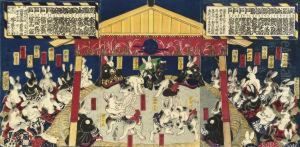Utagawa Yoshifuji Paintings
Utagawa Yoshifuji, born in 1828, was a Japanese ukiyo-e artist who is remembered for his woodblock prints and illustrations that contribute to the rich history of Japanese art. Yoshifuji was a student of Utagawa Kuniyoshi, one of the last great masters of the ukiyo-e genre. Under the tutelage of Kuniyoshi, Yoshifuji developed his own unique style, which often incorporated elements of the fantastical and the whimsical.
Throughout his career, Yoshifuji produced a wide array of prints, including images of warriors, kabuki actors, beautiful women, and scenes from folk tales and mythology. One of his notable series is 'Ogura Imitation of the Hundred Poets,' which he produced in the 1840s. This series is a good example of his work that combines portraiture with a love for literature and poetry.
Yoshifuji was also known for his innovative series of prints depicting children and their games, which were popular during the late Edo period. These prints not only demonstrate his artistic skill but also provide a valuable insight into the social history of Japan, showing the lives and activities of children at play.
In addition to traditional subjects, Yoshifuji is credited with creating some of the earliest examples of 'yokai' imagery—depictions of monsters and supernatural creatures—in ukiyo-e art. His works often carried a humorous tone, and he had a penchant for the playful and the eerie, which set him apart from many of his contemporaries.
Yoshifuji's contributions to the world of Japanese woodblock printing were significant, and his prints continue to be appreciated for their historical value and artistic charm. He passed away in 1887, leaving behind a legacy that continues to influence and inspire artists and enthusiasts of Japanese art.
